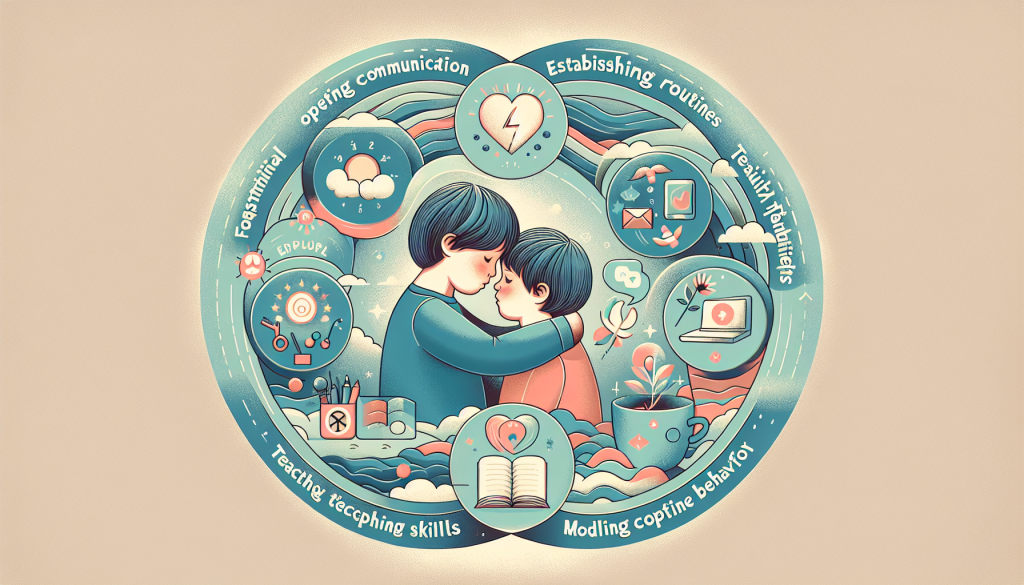“`html
Ways to Support Children’s Mental Health
Introduction
As parents, one of our greatest responsibilities is ensuring the mental and emotional well-being of our children. In today’s fast-paced, technology-driven world, children are exposed to various stressors that can impact their mental health. By understanding the importance of fostering emotional resilience and implementing effective well-being strategies, parents can help their children navigate life’s challenges with confidence and positivity.
In this article, we’ll explore practical, research-backed approaches to support children’s mental health. Whether you’re a parent or preparing to become one, these tips will empower you to connect with your child, nurture their emotional development, and build a foundation for long-term well-being.
Main Points
1. Understanding the Importance of Child Mental Health
Children’s mental health encompasses their emotional, psychological, and social well-being. It affects how they think, feel, and behave in daily life. According to the Child Mind Institute, untreated mental health challenges in children can lead to long-term difficulties, including academic struggles, relationship issues, and even physical health problems.
Recognizing early signs of mental health struggles, such as mood swings, withdrawal, or changes in behavior, is crucial. Addressing these issues early can significantly improve your child’s emotional resilience and overall quality of life.
2. The Role of Emotional Resilience
Emotional resilience is the ability to adapt to life’s challenges and bounce back from setbacks. Children who develop emotional resilience are better equipped to handle stress, build healthy relationships, and maintain a positive outlook on life. Parents play a vital role in fostering this resilience by creating a supportive and nurturing environment.
Research indicates that secure attachments with caregivers are essential for a child’s emotional development. When children feel safe and valued, they are more likely to develop the confidence and coping skills needed to face adversity.
3. Addressing Psychological Needs
Children, like adults, have fundamental psychological needs that must be met for optimal mental health. These include:
- Safety: Children need to feel secure in their environment, both physically and emotionally.
- Autonomy: Allowing children to make age-appropriate decisions helps them develop independence and confidence.
- Self-expression: Encouraging open communication helps children feel understood and valued.
- Belonging: Strong family bonds and a sense of community contribute to a child’s sense of belonging and acceptance.
By addressing these needs, parents can create an atmosphere that promotes mental and emotional well-being.
Practical Recommendations
Below are actionable strategies parents can implement to support their child’s mental health:
1. Foster Open Communication
- Encourage your child to share their thoughts and feelings without fear of judgment.
- Use active listening techniques, such as maintaining eye contact and repeating back what they’ve said to show understanding.
- Ask open-ended questions like, “How was your day?” or “What made you happy today?”
2. Establish Routines
Children thrive on structure and consistency. Establishing daily routines can provide a sense of stability and predictability. This includes setting regular times for meals, homework, play, and bedtime.
3. Encourage Healthy Habits
- Promote physical activity, as exercise is proven to boost mood and reduce anxiety.
- Encourage a balanced diet rich in fruits, vegetables, and whole grains to support brain health.
- Limit screen time and ensure your child gets enough sleep, as rest is essential for emotional regulation.
4. Teach Coping Skills
Help your child develop skills to manage stress and emotions. Techniques such as deep breathing, mindfulness, and positive self-talk can be effective tools for navigating difficult situations. For example, guide them to take deep breaths during moments of frustration or teach them to reframe negative thoughts into positive ones.
5. Model Positive Behavior
Children often mirror the behavior of their parents. Demonstrate healthy ways to handle stress, communicate effectively, and maintain a positive outlook. By being a role model, you can inspire your child to adopt these behaviors.
6. Seek Professional Help When Needed
If you notice persistent changes in your child’s behavior or mood, don’t hesitate to seek professional support. Therapists trained in cognitive-behavioral therapy (CBT) or other evidence-based approaches can provide valuable guidance and support for both you and your child.
Conclusion
Supporting your child’s mental health is one of the most important investments you can make in their future. By fostering open communication, addressing their psychological needs, and implementing practical well-being strategies, you can help them thrive emotionally and socially.
Remember, parenting is a journey, and it’s okay to seek help along the way. By taking proactive steps to nurture your child’s mental health, you’re not only helping them navigate challenges but also equipping them with the tools to lead a happy, resilient, and fulfilling life.
For more resources and expert insights on child mental health, explore articles on the Child Mind website.
“`

